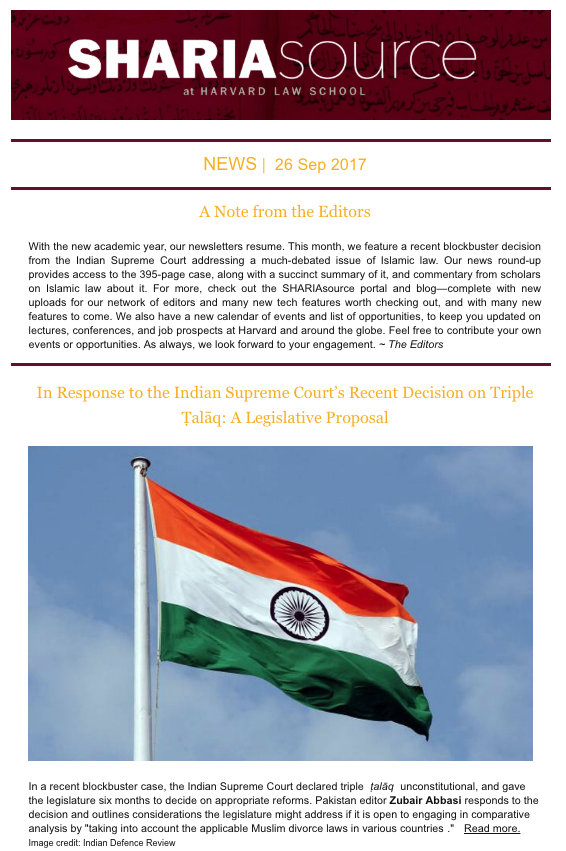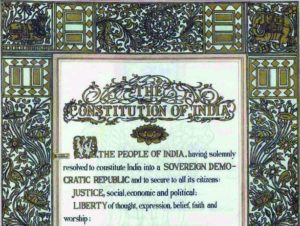
 Response to the Indian Supreme Court’s Recent Decision on Triple Ṭalāq: A Legislative Proposal In a recent blockbuster case, the Indian Supreme Court declared triple ṭalāq unconstitutional, and gave the legislature six months to decide on appropriate reforms. Pakistan editor Zubair Abbasi responds to the decision and outlines considerations the legislature might address if it is open to engaging in comparative analysis by “taking into account the applicable Muslim divorce laws in various countries.” Read more. Image Credit: Wikipedia
Response to the Indian Supreme Court’s Recent Decision on Triple Ṭalāq: A Legislative Proposal In a recent blockbuster case, the Indian Supreme Court declared triple ṭalāq unconstitutional, and gave the legislature six months to decide on appropriate reforms. Pakistan editor Zubair Abbasi responds to the decision and outlines considerations the legislature might address if it is open to engaging in comparative analysis by “taking into account the applicable Muslim divorce laws in various countries.” Read more. Image Credit: Wikipedia
 Indian Supreme Court Judgment Declaring Triple Ṭalāq Unconstitutional In a 3-2 decision, the Supreme Court of India declared triple ṭalāq unconstitutional and gave India’s parliament six months “to consider legislation” for revising the practices previously addressed through triple ṭalāq . In its opinion, the Court cited global advances in Islamic family law (in India, called Muslim personal law), including Islamic law jurisdictions (which India is not) as evidence of the need for legislative reform. Read more. Image credit: Wikimedia
Indian Supreme Court Judgment Declaring Triple Ṭalāq Unconstitutional In a 3-2 decision, the Supreme Court of India declared triple ṭalāq unconstitutional and gave India’s parliament six months “to consider legislation” for revising the practices previously addressed through triple ṭalāq . In its opinion, the Court cited global advances in Islamic family law (in India, called Muslim personal law), including Islamic law jurisdictions (which India is not) as evidence of the need for legislative reform. Read more. Image credit: Wikimedia
 Round-up on Triple Ṭalāq The Indian Supreme Court’s recent decision on the constitutionality of triple ṭalāq is built upon cases from past decades. In this post, we round up some of those cases and commentary about them by editors who work on the region. India editor Akhila Kolisetty addresses the underlying tension between gender equity and a secular state demonstrated in the Danial Latifi case; Pakistan editor Jeffrey A. Redding argues that the crucial 2002 Shamim Ara case telegraphs the judiciary’s intention to assert the unique authority of the modern Indian state. Read the full round-up. Image credit: Indian Supreme Court
Round-up on Triple Ṭalāq The Indian Supreme Court’s recent decision on the constitutionality of triple ṭalāq is built upon cases from past decades. In this post, we round up some of those cases and commentary about them by editors who work on the region. India editor Akhila Kolisetty addresses the underlying tension between gender equity and a secular state demonstrated in the Danial Latifi case; Pakistan editor Jeffrey A. Redding argues that the crucial 2002 Shamim Ara case telegraphs the judiciary’s intention to assert the unique authority of the modern Indian state. Read the full round-up. Image credit: Indian Supreme Court
See the full newsletter.

